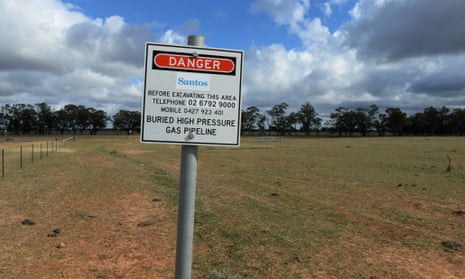The New South Wales government will extend the freeze on coal seam gas (CSG) exploration licences for another year while it continues to investigate the transparency of applications.
The freeze on new petroleum exploration licences announced six months ago was due to end on Friday.
But the resources and energy minister, Anthony Roberts, said the freeze would continue until September 2015.
In March the then premier, Barry O’Farrell, accused the former Labor government of granting petroleum exploration licences “like confetti” and warned the government would audit existing licences.
He also criticised Labor for charging only $1000 for exploration applications, which was “less than Ian Macdonald (former mining minister) spent on his average lunch”.
That fee has since been raised to $50,000.
The extended freeze will give the Office of Coal Seam Gas (OCSG) more time to complete its detailed examination of exploration licences, Roberts told ABC.
“We make no apologies for introducing a level of transparency and openness with respect to petroleum exploration licences,” Roberts said.
About 10 licences have been cancelled, Roberts said, and several licence holders have been issued a show-cause notice as to why theirs should not be revoked.
The decision comes as the NSW chief scientist, Mary O’Kane, prepares to hand her final report into the state’s CSG industry to the government.
The premier, Mike Baird, said the report would be “the line in the sand” on how the industry must operate in NSW.
Conservation groups have welcomed the freeze but say it does not protect the communities already affected.
“It also fails to protect those people living under the shadow of coal seam gas development at Gloucester on the north coast and around the Pilliga in the state’s northwest,” said the NSW Nature Conservation Council’s chief executive, Kate Smolski, on Thursday.
The government “must identify no-go zones to protect important agricultural lands and sensitive natural areas that are too important or sensitive to be put at risk by this dangerous, dirty industry”, she said.
The Lock the Gate alliance wants upfront protections for water resources, farms and bush to be introduced.
“There is currently no protection at all for important water resources or farmland in the north-west and northern rivers or in Sydney’s drinking water catchment,” said Lock the Gate’s national coordinator, Phil Laird.
“The reckless decision by Queensland and the commonwealth governments to allow three huge coal seam gas export projects to be built simultaneously in Queensland has thrown the east coast gas market into some turmoil and sharply driven up the price of gas that households and manufacturers in NSW are being forced to pay.”

Comments (…)
Sign in or create your Guardian account to join the discussion